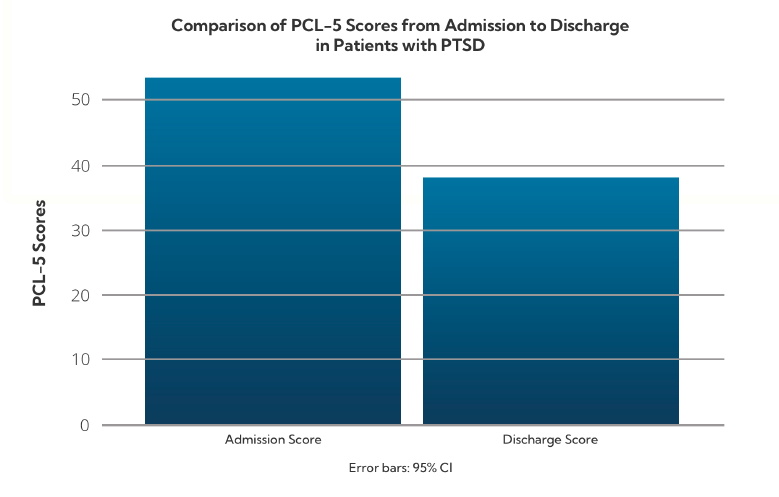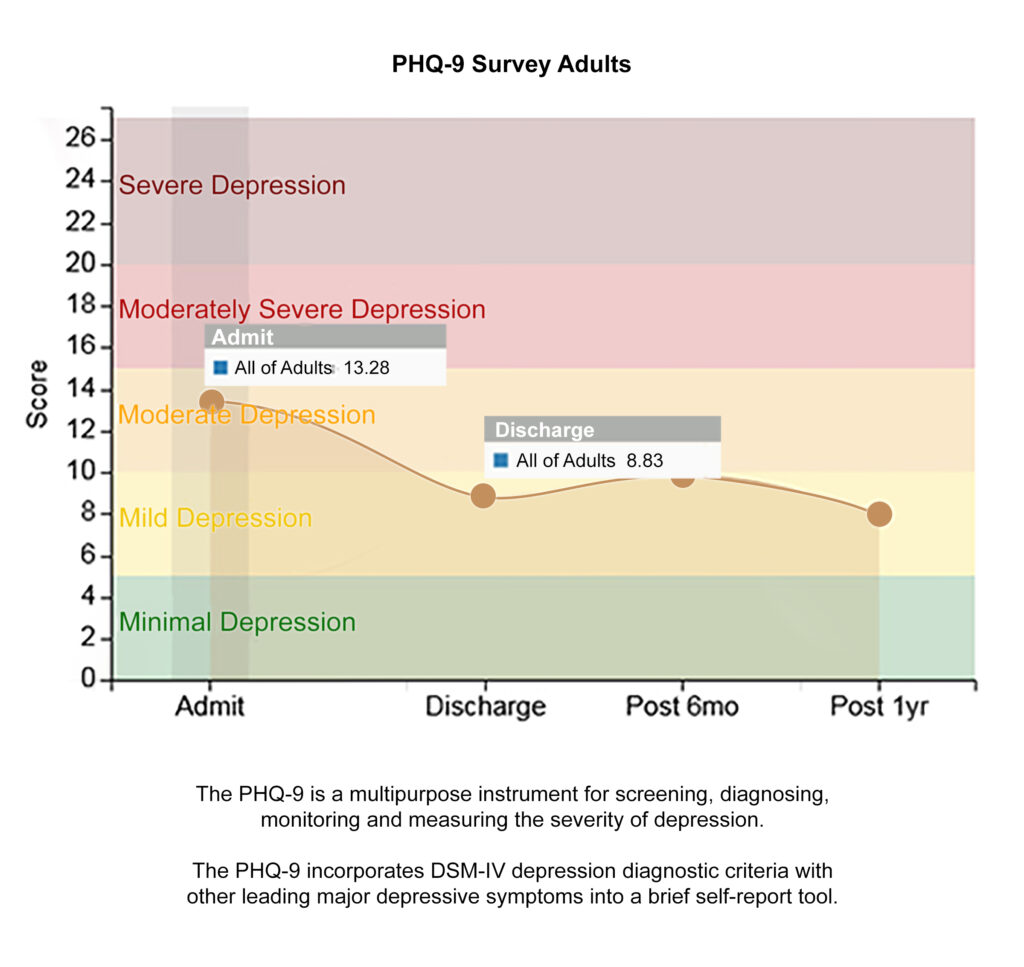Are You Struggling with the Effects of Trauma? We Are Here to Help.
Intense, painful experiences can overwhelm our ability to cope with everyday life. These events trigger powerful thoughts, sensations, and feelings – and often leave us feeling fearful, anxious, and, sometimes, unable to carry on with our lives. People who have faced a traumatic event may end up dealing with additional mental illness or co-occurring disorders, such as mood disorders, eating disorders, or substance abuse. We’re familiar with this pattern, and, in fact, have helped hundreds of men and women overcome the effects of trauma to lead happier, healthier lives.
Many people who come to SunCloud Health are facing the deep-seated effects of trauma experienced at some point in their lives. If you are dealing with a relatively recent trauma, deeply rooted trauma from early childhood, or you are grappling with the painful disorder known as Post-Traumatic Stress Disorder (PTSD), rest assured that help is here.
We know trauma is at the core of many diagnoses. In 2024:
- 65% of patients had a diagnosis of a trauma and stressor-related disorder
- 32% of patients had a diagnosis of post-traumatic stress disorder (PTSD)
- 60% of patients had both a mood and trauma diagnosis
- 26% of patients had a trauma and eating disorder (ED) diagnosis
- 24% of patients had an eating disorder (ED), mood disorder, and trauma diagnosis
- 39% of patients had a substance use disorder (SUD), mood disorder, and trauma diagnosis
- 44% of patients had a trauma and substance use disorder (SUD) diagnosis
“Supporting your desire to live free from self-destructive behavior as you embark on a life long journey of recovery. At SunCloud Health, we view unresolved trauma as the foundation of most self-destructive behaviors that people adopt in their lives. Stripping away the self-defense mechanisms we put in place to protect ourselves from the trauma is a core part of the work we do here.”
Kim Dennis, MD, CEDS
A Closer Look at Trauma and PTSD
Trauma comes in many forms. Below is a brief look into two perspectives of traumatic experiences.
- Rape or sexual assault/abuse
- Severe physical abuse
- Catastrophic injury by car accident, workplace accident, or other traumatic event
- Unexpected death of a partner, relative, or friend
- Witnessing war or violence, including domestic violence
Chronic trauma comes from ongoing or recurring experiences, such as:
- Uncaring, cruel, or invalidating parents, family members, or caregivers
- Inconsistent responses from caregivers
- Criticism or verbal abuse
- Intermittent childhood neglect
- Being bullied or teased
- Alcoholism or addiction in the family
- Chronic instability from financial struggles, homelessness, and other difficulties
Video: Mood Disorders Are Often Manifestations Of Trauma
Dr. Marcia Nickow, PSY.D., CADC, CGP, Organizational Advisor at SunCloud Health on how mood disorders are often manifestations of trauma.
Signs You or a Loved One May Be Suffering from Trauma
If you or a loved one has experienced a traumatic event, there are signs to watch for when considering receiving help from a licensed mental health professional. Trauma symptoms and risk factors may include:
- Inability to trust others
- Difficulty concentrating; easily distracted
- Feeling fear on a regular basis
- Depression and other mood symptoms
- Anxiety
- Feeling uncomfortable in social situations
- Substance use disorders
- Emotional distress
- Prolonged sleep problems
- Eating disorders such as anorexia nervosa, bulimia nervosa, orthorexia, or binge-eating disorder
- Negative thoughts leading to self-injury or suicidal ideation
- Recurring thoughts from the trauma that interfere with everyday life

Video: Navigating Re-Enactments In Treating Patients With Trauma, How To Avoid Perpetuating Trauma
Excerpt taken from the Land Mines and Booby Traps: Navigating Re-enactments in Treating Patients with Trauma, Special Presentation By Kim Dennis, MD, CEDS, and Marcia Nickow, Psyd, CADC, CGP. The healing we can impart as clinicians come with a responsibility to both see and appropriately respond to re-enactments in therapeutic settings. It is on all of us in the professional community to build treatment settings that are healthy, safe, well-boundaried, at all levels of our organizations.
You are not alone. Find PTSD help near you with locations in Chicago, Naperville, Northbrook Illinois
Understanding Post-Traumatic Stress Disorder (PTSD)
When the stress and anxiety from one or more traumatic events are chronic and cause significant life disruption, this may indicate that you’re suffering from Post-Traumatic Stress Disorder. This disorder can be seen as an overwhelming of the body’s normal psychological defenses against stress. After the trauma, an abnormal function of the normal defense systems can develop, which brings on certain PTSD symptoms.
In addition to depression and substance use disorders, people with PTSD often experience co-occurring mental health disorders such as anorexia nervosa, bulimia, binge-eating disorders, and anxiety.


How to Heal and Recover after You Develop PTSD
True transformation begins when you become aware of the trauma you’ve faced and the way you are responding to traumatic memories. Being in a trauma-informed environment such as SunCloud Health – a place where you can feel completely safe – will allow you to be vulnerable and honest as you work with others in group and individual therapy.
As you become aware of the pain you have experienced and the coping strategies you’ve adopted as a result of experiencing symptoms of PTSD, the recovery process begins. Through trauma counseling you will find new and healthier ways of overcoming negative feelings, learn how to process traumatic memories, and develop strong coping skills, which will gradually replace negative or self-destructive behaviors for more positive emotions and outlooks.
Other Types of Trauma
Video: What Is Intergenerational Trauma?
Kim Dennis, MD, CEDS, explains about intergenerational trauma and epigenetics, various forms of trauma that one can experience, and the effects these experiences can leave on a person.
Video: What Is Racialized Trauma?
Hear from Dr. Kim Dennis, MD, CEDS, at SunCloud Health, on racialized trauma and the unequal access to care many persons of color face.
You are not alone. We are here.
If you are experiencing symptoms of PTSD or effects of a traumatic event, we’re here to help.
Trauma-Informed Treatment Programs
We often refer to SunCloud Health as a trauma-informed care center. This simply means we are aware that trauma lies at the heart of what many of our patients face. It means ensuring that everything we do takes into account the effects of trauma – from our treatment plan approach to our physical environment to the staff who support you while you are here.
First and foremost, our responsibility is to provide a safe healing environment where you build a therapeutic relationship with a licensed mental health professional. We recognize that these are human lives in our hands, and as such have a dedication to do what we do in a way that does not cause harm. Too often, mental health treatment centers aren’t set up to support self-reflection at all levels of staff, and end up being places that inadvertently cause hurt, neglect, misdiagnosis, and even re-traumatization. By providing a safe space with staff who have done their own healing and who understand and are trained in recovery, SunCloud Health is better positioned to treat trauma and help clients overcome the brain diseases that are disrupting their lives.

Cognitive Processing Therapy (CPT) for Trauma and PTSD
Cognitive Processing Therapy (CPT) is an evidence-based treatment designed to help individuals process and heal from traumatic experiences. At SunCloud Health, CPT is a core component of our PTSD treatment and trauma treatment programs.
CPT helps individuals identify and challenge unhelpful thought patterns related to their trauma, allowing them to reframe distressing memories and reduce emotional suffering. Through structured sessions, patients learn to develop healthier beliefs about themselves and the world around them, ultimately fostering resilience and recovery.

We Start Trauma Work on Day 1
Trauma treatment begins as soon as you arrive at SunCloud Health. This includes one-on-one and group therapy, prolonged exposure therapy, psychoeducation for the patient and family, cognitive therapy, and more individualized trauma therapy sessions that ensure compassion, connection, structure, and, most importantly, consistency.
Consistency is the most potent way to engender safety and trust, which is why sessions start promptly and last the designated time, and we adhere to each client’s schedule at all times.
Treating Underlying Trauma Is Critical
When Treating Self-Destructive Behaviors Like Eating Disorders
Many medical and psychiatric disorders and substance use disorders are rooted in untreated trauma. Similarly, individuals with addiction, eating disorders, or other compulsive behavior disorders are often unable to abstain or disengage from self-destructive behaviors until they start to work on and understand their early traumas.
We work with clients to address and name the negative feelings that are preventing them from achieving recovery, creating a strategy that brings people together and creates a community. Together, we work to understand how trauma impacts them as adults, how the traumatic experience shaped their view of themselves, how it affects their interactions with others, and more in order to get to the root of the mental health condition.
You deserve healing from trauma. Contact us today.
Find PTSD help near you now. Get specialized PTSD and trauma treatment at our Chicago, Naperville, and Northbrook Illinois
How You Will Heal and Recover from PTSD
True transformation begins when you become aware of the trauma you’ve faced and the way you are responding to it. Being in a trauma-informed environment such as SunCloud Health – a place where you can feel completely safe – will allow you to be vulnerable and honest as you work with others in group and individual therapy.
As you become aware of the pain you have experienced and the coping strategies you’ve adopted as a result, the recovery process begins. You will find new and healthier ways of processing feelings and memories, which will gradually replace negative or self-destructive behaviors.
What Does Trauma-Informed Treatment Look Like?
Recognizing the important role trauma plays in a person’s issues is vital to one’s recovery. Talking about traumatic and impactful negative experiences is often discouraged for fear of triggering other patients, but at SunCloud Health, we courage community and open discussions to recognize and be aware of the role that trauma plays in one’s life.
Trauma-informed treatment means looking at all aspects of this role and how trauma affects and/or leads to co-occurring mental health conditions, such as eating disorders, substance use disorders, and mood and anxiety disorders, among others. That’s why we’ve developed a comprehensive approach to treatment that focuses on the following key principles to create the focus needed to help you or a loved one overcome the effects of trauma or PTSD.

Safety
Throughout the organization, our staff and the people they serve feel physically and psychologically safe. The physical setting is safe and interpersonal interactions promote a sense of safety.
Trustworthiness and transparency
Our programs and treatments are administered in an open manner to build and maintain trust among staff, clients, and family members of patients.
Collaboration and mutuality
We foster true partnering between staff and clients and among staff from direct care staff to administrators. We recognize that healing happens in the context of relationships and in the meaningful sharing of power and decision-making.
Empowerment
This means that employees and clients are given the power to determine the course of treatment. Individual strengths are recognized, built on, and validated and new skills are developed as needed.
Voice and choice
We aim to strengthen staff, clients, and family experience of choice and recognize that every person’s experience is unique and requires an individualized approach.
Peer support and mutual self-help
Encouraging individuals to help one another in the recovery process is key. This principle builds trust, establishes safety, and fosters empowerment.
Resiliency and strengths-based approach
We believe in the resilience of individuals, organizations, and communities to heal and promote recovery from trauma. We focus on building from strengths rather than responding to perceived deficits.
Peer support and mutual self-help
Encouraging individuals to help one another in the recovery process is key. This principle builds trust, establishes safety, and fosters empowerment.
Video: What Is Important Information For A Patient To Keep In Mind When Starting Treatment For Trauma?
Kim Dennis, MD, CEDS, Co-Founder and Medical Director at SunCloud Health, discusses important information for patients to know and keep in mind when starting treatment for trauma.
Video: We Have To Work On The Trauma
Dr. Marcia Nickow, PSY.D., CADC, CGP, Organizational Advisor at SunCloud Health on the important role of trauma work.
What Happens After Completing Trauma and PTSD Treatment at SunCloud?
SunCloud Health is in an ideal position to support you before, during, and after PTSD treatment and trauma treatment, for as long as our services are useful to you. With multiple levels of outpatient care (PHP, IOP, individual, and family therapy), you may decide to stay connected through one of our aftercare outpatient groups – or you may want to continue seeing one of our individual therapists. We are here to provide continuous, caring support for your recovery journey.
Though we understand fully that you don’t want to spend your life in treatment, we also know from experience that a lifetime commitment to wellness is the foundation of your well-being over the long term. We will work with you to maintain a healthy outlook, which means achieving balance, honesty, and health — physical, emotional and spiritual. Our goal is to create a care plan that you can take with you forever, wherever you may go.
From admit to discharge, we see an aggregate improvement in our adults as measured by the PHQ-9. Lower scores reflect an improvement.

Video: As Treatment Providers At SunCloud Health, We Try To Practice What We Preach
Video: Is The Development Of An Eating Disorder One Of The Potential Effects Of Trauma? Data Suggests That The Definitive Answer Is ‘Yes’.
Dr. Timothy Brewerton, MD, DLFAPA, FAED, DFAACAP, CEDS-S, breaks down the “Three Es of Trauma,” navigating the deep-seated connections between trauma and eating disorders.
Dr. Gabor Maté on Trauma

Early childhood stress (or trauma) results in adaptations that help a child survive in the short term but are the basis of pathology for physical illness and mental illness later on in life…
Contact us to speak with a mental health professional about PTSD treatment.
We are here for you.
SunCloud’s reputation is one of the highest quality providers of integrative outpatient treatment in Chicago and the country. They did not disappoint me and cared for me with compassion and forgiveness. The program is highly individualized, and I had plenty of time with my therapist. I was treated medically, psychologically and spiritually by a well-trained, well-educated and highly experienced care team. I received all that I could ask for and more.
SCH patient
Get PTSD Help Near You Today
Thinking about seeking help or know someone who does? Click below to have one of our professional team members contact you.
Explaining SunCloud’s Integrated ModelWhy is an integrated treatment model essential to successfully treating patients?
Dr. Kim Dennis, Co-Founder and Medical Director at SunCloud Health, discusses the vital role the integrated model (that she is pioneering at SunCloud Health) plays in the success of treating patients with co-occurring disorders and underlying trauma. How does SunCloud create an authentic culture of patient support?
